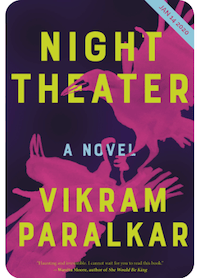In a small Indian village, an unnamed surgeon receives the most unlikely of evening visitors: a teacher, his pregnant wife and their young son, all of whom are dead.
So begins Vikram Paralkar’s “Night Theater” (2020, Catapult). These unexpected guests explain to their host that he alone can save them: if he agrees to perform surgery on the family and fix their wounds, they will receive another chance at life, but he must complete the task before dawn.

While the premise sounds gruesome, Paralker’s writing allows his novel to walk the lines between being magical yet realistic, detailed yet mythical, and thrilling yet philosophical.
After listening to their plea, the aging and curmudgeonly surgeon reluctantly agrees to help the family, but his challenges in doing so seem insurmountable. Most obviously, attempting to bring the dead back to life is uncharted territory. Despite the impossibility of the task before him, the surgeon must do so within the confines of a decaying clinic that is lacking basic supplies and machinery.
Earlier in the day, leading up to the arrival of the dead, the surgeon grapples with a corrupt government official who fails to take advantage of him, but whose feeble attempts at threats and potential bribery manage to fill the surgeon with anger and disgust well into the evening. A scandal in the surgeon’s past has forced him to finish out his career in this destitute and remote clinic, despite his extreme dislike for the town and just about everything and everyone in it.

Wrestling with his anger toward the official and his disdain for his surroundings, the surgeon struggles with the proposition of helping the family – are they trying to trick him in some way? If they aren’t, how did they get there? Is helping them the right thing to do, or does it fly in the face of knowledge that the living simply shouldn’t possess? Is choosing whether or not to help them a test in and of itself? What will happen if he can’t do what is asked of him, and what will happen if he succeeds?
Throughout the many dilemmas the surgeon must face, both mentally and physically, Paralker delivers a narrative that is both poetic and extremely matter-of-fact, as the book’s opening line demonstrates so well: “The day the dead visited the surgeon, the air in his clinic was laced with formaldehyde.”
Medical-sounding descriptions such as “the sun was a bag of blood sliced open by the horizon” and “the air seemed to clot, grow viscous” establish a setting that is both clinical, as well as palpable, while the dead family exist before the surgeon without any blood coursing through their veins. The surgeries performed are described in great detail and are not for the faint of heart, but their thorough accounts skew much more toward medical in nature than they do gory – Paralker is a physician, and his wealth of knowledge when writing about the human body is evident.
This short novel has an exciting plot that reads quickly, but its complexity requires time for consideration.
Check out “Night Theater” at your closest Denver Public Library locations, and find more information about this title and its author at https://books.catapult.co/products/night-theater-a-novel-by-vikram-paralkar.
Hannah Evans is the senior librarian at the Smiley Branch of the Denver Public Library.

Be the first to comment